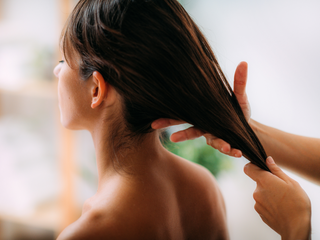Hair loss isn’t just about the strands you see in the shower drain. It’s about confidence, identity, and that frustrating feeling of doing everything "right" with no visible results.
If you've been hunting for hair growth tips or typing "hair growth remedies at home" or "hair growth tips Hindi" into search bars, you're not alone. And if you’ve tried everything from serums to supplements with little success, it might be time to go back to nature.
These DIY, science-backed remedies are not just gentle on the scalp—they're effective. Especially if you have a sensitive scalp or are trying to avoid harsh, chemical-heavy solutions like minoxidil.
Why Isn’t Your Hair Thriving?
Let’s begin with the basics: why your hair may not be growing well. These are often overlooked root causes that weaken follicles and disturb the hair cycle.
Common causes include:
-
Scalp inflammation or buildup – This blocks follicles and reduces oxygen and nutrient flow to the roots.
-
Poor nutrition – Your hair reflects what you eat. Deficiencies in protein, zinc, iron, and biotin can impact growth.
-
Hormonal imbalance (including male pattern hair loss) – DHT sensitivity can shrink hair follicles over time, especially in men.
-
Heat or chemical treatments – These weaken the hair shaft and may irritate the scalp.
-
Stripping shampoos – Harsh sulfates can disrupt your scalp's microbiome and natural oils.
Important insight: Your scalp is skin. And just like your face, it needs the right balance of nourishment and repair. If your scalp is inflamed or imbalanced, even the best hair growth oil at home won’t deliver results.

Rosemary oil is clinically backed to support regrowth as effectively as minoxidil.
Hero Ingredients for Hair Growth
The right ingredients can dramatically improve blood flow, soothe inflammation, and encourage thicker hair regrowth.
1. Rosemary: The Most Researched Hair Revival Herb
According to a 2024 comparative study on ResearchGate, rosemary essential oil promoted hair regrowth as effectively as 2% minoxidil after 6 months of use—with fewer side effects. It boosts circulation, reduces inflammation, and supports follicle health.
Use as: An oil infusion or scalp rinse that you can apply post-wash.
2. Essential Oils: Natural Scalp Tonics
In MDPI 2023 lab studies, essential oils such as lavender and rosemary significantly increased key hair-growth markers like VEGF and IGF‑1 in human dermal papilla cells—indicating direct support at the root level of hair growth.
Essential oils offer both therapeutic and aromatic benefits that support scalp healing.
-
Lavender – Known to promote follicle depth and reduce stress, a common contributor to hair fall.
-
Peppermint – Stimulates blood flow, especially in areas showing signs of thinning.
-
Tea tree – Fights microbial buildup that leads to flakes and irritation.
How to use: Always dilute essential oils in a cold-pressed carrier oil to avoid irritation. Never apply them directly.
Read more: Top 5 Hair Growth Essential Oils
3. Cold-Pressed Carrier Oils: Deep Scalp Nourishment
These oils retain vitamins, fatty acids, and antioxidants vital for scalp health.
Choose nutrient-rich, cold-pressed oils:
-
Coconut oil – Penetrates hair shaft to deeply moisturize and prevent protein loss. Source
-
Almond oil – Rich in Vitamin E, it improves elasticity and soothes dryness.
-
Jojoba oil – Mimics natural sebum and helps rebalance an oily or dry scalp.
These oils make an excellent base when learning how to oil the hair naturally.
3 Easy Hair Growth Remedies You Can Make at Home
Simple recipes that nourish your scalp and promote consistent regrowth.
1. Rosemary Hair Rinse
Benefits: Strengthens roots, boosts scalp circulation, and refreshes the scalp post-cleansing.
Ingredients:
-
2 tbsp dried rosemary (or a handful of fresh sprigs)
-
2 cups water
Steps:
-
Boil the water and add rosemary.
-
Simmer for 10 minutes, then cool.
-
Strain and pour into a spray bottle.
Usage: Use as a last rinse or scalp mist after shampooing. Store refrigerated and use within 5 days.
2. Overnight Hair Growth Oil with Activated Oils™
Benefits: Stimulates follicles, nourishes the scalp, and supports visible growth over time.
Ingredients:
-
2 tbsp cold-pressed coconut oil
-
1 tbsp almond oil
-
3 drops rosemary essential oil
-
2 drops lavender essential oil
-
1 drop peppermint oil
Steps:
-
Slightly warm the base oils (don’t overheat).
-
Add the essential oils and stir gently.
-
Massage into your scalp with fingertips for 5–10 minutes.
Why this works: Warm oiling improves absorption and increases blood flow to dormant follicles.
Common mistakes to avoid:
-
Using synthetic oils that don’t offer therapeutic benefits.
-
Skipping massage, which is crucial for follicle stimulation.
3. Aloe & Oil Hair Mask
Best for: Sensitive, itchy, or flaky scalps needing moisture and calming.
Ingredients:
-
2 tbsp fresh aloe vera gel
-
1 tsp cold-pressed jojoba oil
-
1 drop tea tree oil
Steps:
-
Mix ingredients until smooth and apply to damp scalp.
-
Leave on for 30 minutes.
-
Rinse off with lukewarm water.
Pro Tip: Apply once a week to soothe inflammation and enhance overall scalp comfort.

Massaging oil for 5–10 minutes improves blood flow and follicle strength.
How to Oil the Hair: The Right Way
A 2016 study published in ePlasty found that 4 minutes of daily scalp massage for 24 weeks significantly increased hair thickness by stretching dermal papilla cells and promoting circulation.
Even the best DIY hair growth oil at home won’t work if you apply it incorrectly.. Here’s how to oil the hair correctly:
-
Choose the right oil for your concern (coconut for dryness, jojoba for dandruff, rosemary for regrowth)
-
Warm it slightly between your palms to enhance absorption
-
Massage for 5–10 minutes to boost circulation
-
Leave overnight or at least 1 hour
-
Wash with a gentle, sulfate-free shampoo like Oleum Cottage’s Restorative Shampoo
Frequency: 2–3 times a week is ideal for most scalp types.
Common mistakes to avoid:
-
Applying and immediately rinsing.
-
Overusing oils—use enough to coat, not drench.
-
Inconsistency—sporadic routines reduce long-term effectiveness.

Real results need real consistency—give your routine 4–6 weeks.
Real Growth Needs Real Consistency
Natural hair growth remedies aren’t quick fixes—but they work. These tips, if followed consistently for 4–6 weeks, can lead to visible changes.
Support your efforts with:
-
Anti-inflammatory foods (nuts, seeds, greens)
-
Stress management (yoga, deep breathing)
-
Good sleep and hydration (7–8 hours of sleep and 2–3 liters of water daily)
Don’t forget to try our Hair Growth Oil that is made with our proprietary blend of Activated Oils – using therapeutic grade oils like Rosemary, Wheatgerm, Thyme, that will stimulate hair follicles and give you visible results. Over time, consistent routines can turn weak, thinning hair into a crown you’re proud of.
FAQs About Hair Growth & Natural Remedies
1. What are the best hair growth tips for thinning hair?
The best tips include massaging your scalp regularly, using cold-pressed oils like rosemary hair oil, avoiding heat styling, and following a nutrient-rich diet. These small, consistent habits help improve blood circulation and support healthier hair growth.
2. How do I make rosemary oil for hair at home?
To make rosemary oil for hair:
-
Steep fresh rosemary in cold-pressed coconut or almond oil over low heat for 5–7 minutes.
-
Let it cool, strain, and store. Use this rosemary hair oil 2–3 times a week for best results.
3. Can I use hair growth oil at home instead of chemical treatments?
Yes. Hair growth oil at home made with essential oils like rosemary, lavender, and peppermint can be just as effective—without harsh side effects. They also work well for people with sensitive scalps.
4. What are some natural hair growth remedies at home?
Some effective DIY remedies include:
-
Rosemary scalp rinse
-
Overnight oil massages with cold-pressed oils
-
Aloe vera and jojoba scalp masks
These hair growth remedies at home support follicle health and soothe inflammation.
5. Does rosemary hair oil help with male pattern hair loss?
Yes, research shows rosemary oil can improve blood flow and reduce DHT activity—key factors in male pattern hair loss. Consistent use over 4–6 months may help slow thinning and stimulate regrowth.
6. How to oil the hair for maximum growth benefits?
Warm your oil slightly, apply directly to the scalp, and massage for 5–10 minutes. Leave overnight or for at least an hour before washing. This enhances absorption and boosts circulation.
7. Are there hair growth tips in Hindi I can follow at home?
Yes, many Ayurvedic-inspired hair growth tips Hindi include using bhringraj, amla, and cold-pressed oils for oiling routines. You can also make rosemary hair oil at home using traditional infusion methods.
8. How long do natural hair growth remedies take to show results?
You’ll usually see visible improvement after 4–6 weeks of consistent use. Natural solutions work gradually by restoring scalp health and strengthening the hair shaft.
9. Can I combine DIY and store-bought hair growth oils?
Absolutely. You can use a hair growth oil at home and also alternate with professionally formulated blends like Oleum Cottage’s Deeply Conditioning Hair Growth Oil, which uses therapeutic-grade essential oils.
10. Will these remedies work if I have a sensitive scalp?
Yes, as long as you use cold-pressed carrier oils and dilute essential oils properly. Natural blends like rosemary hair oil are gentle and particularly effective for inflamed or itchy scalps.
Related Reading:
· Top 5 Hair Growth Essential Oils
· How to treat Dandruff at home
· Getting to the root of hair loss
About the Authors
Vidhi Dave is a certified Aromatherapist with 11 years of experience specialising in the therapeutic use of essential oils and cold-pressed oils for chronic skin and scalp concerns like eczema, dermatitis, and psoriasis. As co-founder of Oleum Cottage, she leads one-on-one aromatherapy consultations, guiding customers on how plant oils can restore balance and resilience to sensitive skin. Known for her deep knowledge of oils and their emotional as well as physical benefits, Vidhi helps people reconnect with nature’s healing intelligence in their daily routines.
Kasturi Sen is a certified practitioner in Cosmetic Science and Formulation with over 10 years of experience in designing evidence-based, natural solutions for chronic skin conditions. As co-founder of Oleum Cottage, she focuses on research-driven product development rooted in dermatological science and modern studies on skin physiology. Kasturi is known for her calm, intuitive presence and her ability to bridge cosmetic science with plant-based formulations, offering personalised, science-backed skincare journeys that empower people to manage their skin confidently.


